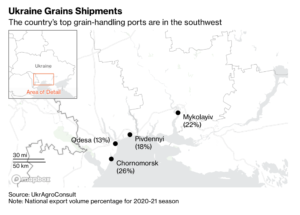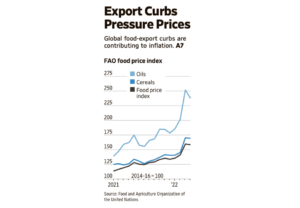President Donald Trump on Friday signed an executive order temporarily expanding the amount of beef the U.S. can import from Argentina, a move the White House says is aimed at…
Turkey in Negotiations With Moscow and Kyiv to Open Grain Export Corridor
Alistair MacDonald, William Mauldin and Ann M. Simmons reported in today’s Wall Street Journal that, “Russia is open to easing its blockade of Ukraine’s ports along the Black Sea if sanctions on Moscow are lifted, a Russian official said Wednesday, a move that, if it went ahead, could increase grain exports and help relieve rising food inflation and shortages.”
But a Ukrainian official on Wednesday questioned whether Moscow could be trusted and urged world leaders to instead focus on ending the war and strengthening sanctions. A senior U.K. official also rejected the idea of lifting sanctions, a potential early indication of where other Western governments might fall.
The Journal article indicted that, “State Department spokesman Ned Price said, ‘We certainly won’t lift our sanctions in response to empty promises, and we’ve heard empty promises before from the Russian Federation. Our nonfood sanctions will remain in place until Putin stops his brutal war.'”
MacDonald, Mauldin and Simmons explained that, “Elsewhere, Poland and Lithuania say they will make space available at seaports, while Warsaw has suggested sending trucks to help bring the wheat out of Ukraine. The European Union is looking at ways to streamline the movement of food across Ukraine’s borders. Kyiv itself wants to invest in new border posts and expand its roads to cope with the influx of grain cargoes.
“The current routes out of Ukraine, which mainly involve putting grain on trucks and trains to be sent to Romanian and Baltic ports, are sometimes subject to weeks of delays and border queues as long as 9 miles. The increased journey time is adding to the costs for Ukraine’s cash-strapped farmers and making grains even more expensive.”
Reuters writer Sabine Siebold reported yesterday that, “Ukraine’s Foreign Minister Dmytro Kuleba said on Wednesday that Russia was trying to ‘blackmail‘ the international community by raising the possibility of an offer to unblock Black Sea ports in return for a relaxation of sanctions.”
And Reuters News reported today that, “British foreign minister Liz Truss accused Russian President Vladimir Putin of holding the world to ransom over food, responding to a question about whether she supported lifting sanctions in exchange for grain exports from Ukraine.”
Meanwhile, Bloomberg writer Natalia Drozdiak reported yesterday that, “The Netherlands would consider joining an alliance to send warships to escort grain supplies stuck in Ukrainian ports but would need assurances from Russia and, ideally, involvement from Turkey, according to the Dutch defense minister.
“Estonia and Lithuania have been calling to establish a coalition of the willing to send naval escorts for grain freighters, as European officials decry Russia’s effective blockade of Ukrainian ports that’s left Kyiv struggling to get grain shipments out.”
With respect to Turkey, Reuters writer Orhan Coskun reported today that,
Ankara is in negotiations with Moscow and Kyiv to open a corridor via Turkey for grain exports from Ukraine, a senior Turkish official told Reuters on Thursday.
The Reuters article stated that, “Ukraine’s Black Sea ports have been blocked since Russia invaded in February and more than 20 million tonnes of grain are stuck in silos there. Russia and Ukraine account for nearly a third of global wheat supplies and the lack of exports from Ukraine is contributing to a growing global food crisis.
“‘Turkey is negotiating with both Russia and Ukraine for the export of grains from Ukraine,’ the official said, requesting anonymity.
“‘With a corridor to be opened from Turkey, there was a demand for this grain to reach their targeted markets. Negotiations are still ongoing,’ the person added.”
Still, Bloomberg writers Andrea Dudik and Rosalind Mathieson reported yesterday that, “Resuming Ukrainian grain shipments will be time consuming given challenges that include mine-clearing in Black Sea ports and the need for cooperation from the very country that kicked off the war, Lithuanian President Gitanas Nauseda said.”

And more broadly on the ongoing impacts of the Russian invasion, Jason Douglas, Jon Emont and Vibhuti Agarwal reported in today’s Wall Street Journal that, “Countries around the world have enacted a wave of export curbs on food since the start of the Ukraine war, a trend that economists say risks aggravating shortages and global food-price inflation.
“On nearly every continent, nations have put new restrictions and bans on products ranging from wheat, corn and edible oils to beans, lentils and sugar. Lebanon has even banned the export of ice cream and beer.
“The cascade of restrictions marks another setback for unfettered global trade, which has been dented in recent years by tariff and regulatory spats between the U.S. and China and moves by countries to safeguard supplies of medical equipment and vaccines during the coronavirus pandemic.”

Today’s Journal article added that, “For governments, limiting food exports is a way to soothe public anger over rising prices and beef up domestic supplies, particularly after Russia’s invasion of Ukraine disrupted global food markets and raised prices for many commodities. Both countries are major exporters of grains and vegetable oils.
“Economists, though, say experience has shown that restrictions on food exports inevitably push global prices up further as importers buy what they can from reduced supplies. While governments may get a brief respite from surging prices, they are rarely significant or long lasting, usually because farmers respond by limiting production or switching to other crops that attract better prices at home and abroad.”





